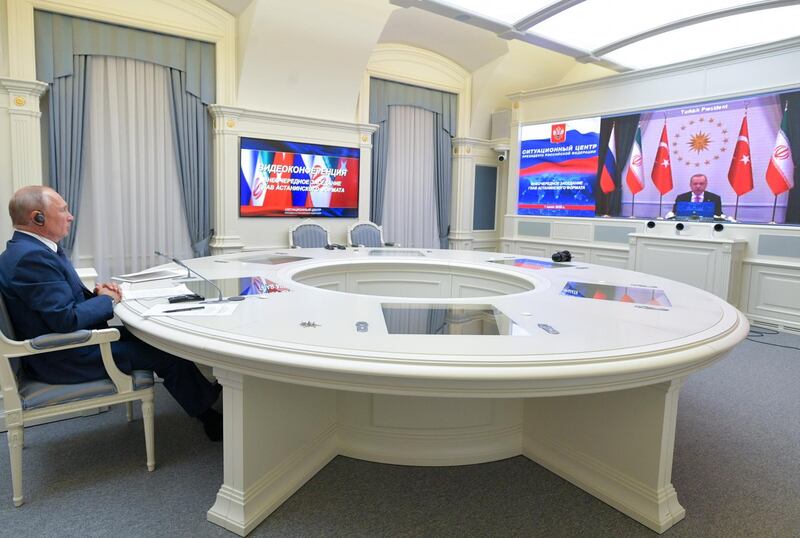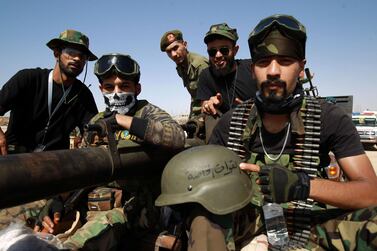Buoyed by a successful referendum on constitutional reforms that could allow him to extend his rule until 2036, Russian President Vladimir Putin is set to refocus his energy and attention on his country's foreign policy agenda. This could have consequences for the Middle East, particularly as Russia re-engages with Iran and Turkey over the future of war-torn Syria. Also worth watching is its relationship with the US, a strategic competitor in the region and elsewhere.
Syria seems to have returned to prominence. Last week, Mr Putin held a virtual meeting with Recep Tayyip Erdogan and Hassan Rouhani, his Turkish and Iranian counterparts and partners in the "Astana Process" that is aimed at ending the conflict there.
I am given to understand that the meeting was mostly a formality, with sticky issues being avoided. Nevertheless, it gave Moscow an opportunity to demonstrate to the world that, despite its differences with Ankara, Russia is not in a state of overt conflict with Turkey. Libya, where both countries also have divergent interests, may not have been a talking point at this meeting. But it could be on the table in the near future.
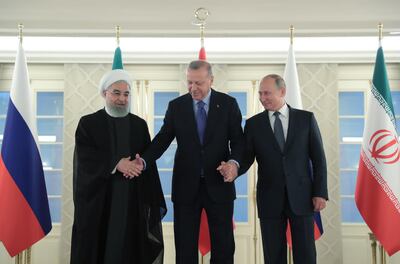
Russia is mindful of America's growing interests in Syria. It is convinced that with the Caesar Act – US legislation that imposes strict sanctions on the Assad regime and its backers as well as allies – Washington has launched a process of economically isolating the country. Wary of being saddled with a bankrupt regime in Damascus, this act of US Congress complicates Moscow's strategy there.
Furthermore, it is worried that the impact of sanctions on Russian companies operating in Syria, both in the military and civilian sectors, could hamper its diplomatic efforts in the region and convince the Russian public to demand disengagement.
Despite its bullish rhetoric, the Iranian regime is also concerned about impact of the Caesar Act. Tehran's military operations and those of its allies such as Lebanese militia Hezbollah will be considerably set back – as will Iran's ability to import arms from countries such as Russia.
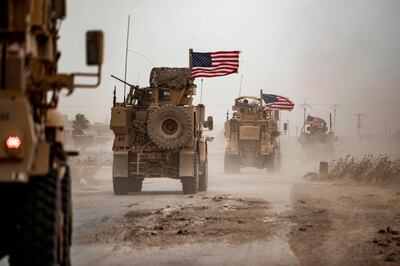
Last week, US Secretary of State Mike Pompeo urged UN Security Council members to extend the international arms embargo on Iran, which expires on October 18. He pointed to possible threats from Tehran to international navigation in the Strait of Hormuz and the Arabian Sea, saying failure to renew the embargo would leave Iran to buy advanced military equipment for its proxies across the Middle East, including Hamas, Hezbollah and the Houthis.
Alluding to Greek mythology, Mr Pompeo added that Iran would effectively "hold the Sword of Damocles over the economic stability of the Middle East, endangering nations like Russia and China that rely on stable energy prices".
He also challenged his Iranian counterpart Mohammad Javad Zarif, who was in attendance, to specify who Tehran's targets would be if the embargo was extended. “President Rouhani recently declared 'Iran will give a crushing response if the arms embargo on Tehran is extended'. I hope [Mr Zarif will] tell us whom he intends to crush and how he will crush them."
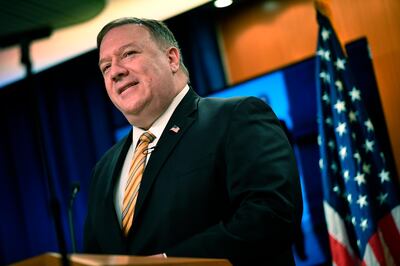
Mr Zarif, however, stressed that ending the arms embargo was a key condition for preserving the 2015 nuclear deal, which the Trump administration withdrew from two years ago. Mr Zarif also warned the European troika of France, Germany and the UK against joining the US-led sanctions regime.
Putting the war of words aside, the primary purpose of Mr Pompeo's remarks was evidently to reach out to Russia and China – which have veto powers in the council – with both countries currently opposed to the idea of renewing the embargo. But it does not help that relations between the countries are strained at the moment. Washington and Beijing are increasingly at odds over a number of issues, including strategic interests in Asia.
Russian-American relations, meanwhile, are tense for a variety of reasons as well, including Washington's redeployment of troops from Germany to Poland – closer to Europe's borders with Russia. Another thorny issue – although not as important to Moscow – could be Israel's planned annexation of parts of West Bank and Jordan Valley, which has the Trump administration's support. But most controversial are claims that emerged last week of Russian operatives paying Taliban militants to attack US troops stationed in Afghanistan. Moscow has denied these allegations.
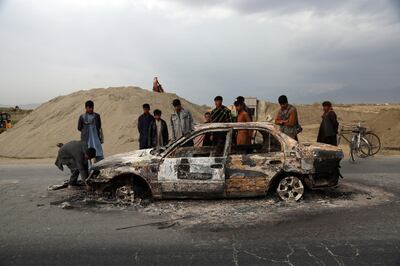
US President Donald Trump is also in the line of the US media's fire for allegedly ignoring these accusations when they were originally brought to his notice. But while it is one thing to say that Mr Trump allegedly knew about it and turned a blind eye, it is entirely another thing that these bounties were allegedly being offered from 2014, when Barack Obama was US president, as claimed by a former Taliban spokesman.
Zooming out, relations between the US on the one hand and Russia and China on the other could, in all likelihood, worsen over the Iranian question. And yet, it is not clear which way the vote will go in October. Will Russia and China jointly veto America's motion, or is there a surprise deal in the making?
Raghida Dergham is the founder and executive chairwoman of the Beirut Institute
